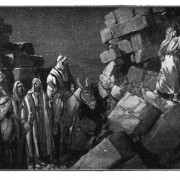One Last Revival?
I’ve been thinking about and praying for a revival. For years. Specifically, and more so even lately, I’ve been praying and hoping for a Josiah revival.
What’s a Josiah revival? It’s a last ditch kind of revival … one more mighty move of God before judgment falls. And fall it most certainly will.
Consider the sin of Sodom. Usually, we equate the sin of Sodom with overt and aggressive homosexuality. Yet those were only the final symptoms of their sin. God Himself describes what they in Sodom had done:
“Look, this was the iniquity of your sister Sodom: she and her daughter had pride, fullness of food, and abundance of idleness; neither did she strengthen the hand of the poor and needy. {50} And they were haughty and committed abomination before Me; therefore I took them away as I saw fit.” (Ezekiel 16:49-50)
First, Sodom was proud. Pride is a reflection of self-sufficiency, that somehow we have accomplished or gained what we have on our own. President Abraham Lincoln ascribed this meaning of pride to the United States, mired at the time in a brutal Civil War which would ultimately take the lives of as many as 750,000 Americans. In his 1863 Thanksgiving Proclamation, Lincoln wrote of the untold blessings that our nation had received. After citing what he called the choicest bounties of heaven, he mourned:
“…We have vainly imagined, in the deceitfulness of our hearts, that all these blessings were produced by some superior wisdom and virtue of our own. Intoxicated with unbroken success, we have become too self-sufficient to feel the necessity of redeeming and preserving grace, too proud to pray to the God that made us.”
That is precisely what Sodom had done. They were a successful city-state, rich with agricultural and commercial success, wealthy and prosperous. But they thought they’d done these things themselves. They were proud, fat, and with much discretionary time on their hands. Their work week was short, they were materially satisfied, and so they turned their attention to pleasure and the lusts of the flesh. And because the flesh can never be satisfied, they devolved further and further from Divinely ordained sexual relations between a husband and wife. They ended up with total sexual confusion and perverted expression of their sexuality.
We (in the United States) are much like Sodom. Our lust and will to live without truth and accountability to the God who made us has led us to unimaginable national sin.
At the top of the list of our national sins has been the holocaust of abortion. This holocaust has claimed the lives of at least 54,000,000 innocents since 1973. How large is this number? It represents 1,367 million babies per year that have died. That number is far greater than ALL casualties of war from every war in which the U.S. has been involved since 1775.
President Lincoln believed that the Civil War was God’s just judgment for the sin of slavery. A former professor of mine once queried our class, “If the blood atonement for the sin of slavery was the Civil War, what do you suppose will be the blood atonement for the sin of abortion?”
It is evident to many that judgment is on its way (remember the Billy Graham quote, “If God does not judge America, He owes an apology to Sodom and Gomorrah”?).
But … perhaps … there can be one last mighty move of God prior to that judgment falling. A Josiah revival.
Josiah was the grandson of Manasseh, and the son of Amon. Manasseh reigned in Judah for fifty-five years, and Amon for two. The spiritual wickedness that accumulated in those years is unimaginable. Even though Manasseh repented and was forgiven, the damage had already been done. The LORD spoke through Jeremiah to say that judgment was inevitable, and that it would be horrible.
Then the LORD said to me, “Even if Moses and Samuel stood before Me, My mind would not be favorable toward this people. Cast them out of My sight, and let them go forth. {2} And it shall be, if they say to you, ‘Where should we go?’ then you shall tell them, Thus says the LORD: “Such as are for death, to death; and such as are for the sword, to the sword; and such as are for the famine, to the famine; and such as are for the captivity, to the captivity.”’ {3} And I will appoint over them four forms of destruction,” says the LORD: “the sword to slay, the dogs to drag, the birds of the heavens and the beasts of the earth to devour and destroy. {4} I will hand them over to trouble, to all kingdoms of the earth, because of Manasseh the son of Hezekiah, king of Judah, for what he did in Jerusalem.”
After Manasseh and Amon, Josiah became king when only 8 years old. Somehow, by the sovereign grace of God, he was cut out of a completely different bolt of cloth. At age 16 he began to seek the God of his father David, and at age 20 he began to aggressively purge idolatry from Judah and Jerusalem. And at 26 he was exposed to the Word of God through Hilkiah the priest and Shaphan the scribe.
What happened then was amazing and incredible. Covenants were made, purging and repentance continued, Passover was observed, the Word of God spread. All told, Judah experienced the effect of Josiah’s reign from the time he was twenty to the time he died at thirty-nine. The land which had been so full of sins and idolatry of every kind was now a nation under God. Such a drastic change could only be produced by God Himself, using His Word and anointed leadership.
After Josiah died, they lived once again with no fear of the LORD. It was only a matter of time before the fall of Jerusalem and the Babylonian captivity.
A Josiah revival.
One last time when someone … when many some ones … begin to seek God with all their hearts.
One last time when idolatry and sin is purged.
One last time when the Word of God is discovered, preached, taught, believed, and obeyed.
One last time before the inevitable judgment of God falls upon America.
Can we pray for revival? Should we hope for revival? Is it possible that one last Josiah revival will come?









